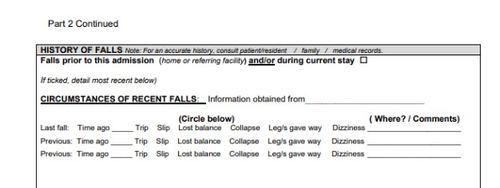Dementia Fall Risk for Beginners
Dementia Fall Risk for Beginners
Blog Article
Dementia Fall Risk Can Be Fun For Everyone
Table of ContentsRumored Buzz on Dementia Fall RiskSome Of Dementia Fall RiskSome Known Factual Statements About Dementia Fall Risk The Buzz on Dementia Fall RiskDementia Fall Risk Can Be Fun For Everyone
The FRAT has 3 areas: fall threat standing, danger factor list, and action strategy. A Loss Risk Condition consists of information about history of recent drops, drugs, psychological and cognitive status of the individual - Dementia Fall Risk.If the patient scores on a risk aspect, the matching number of points are counted to the patient's autumn danger rating in the box to the far ideal. If a client's fall risk rating completes 5 or greater, the individual is at high danger for falls. If the client scores only four points or lower, they are still at some risk of dropping, and the registered nurse needs to utilize their finest scientific analysis to take care of all autumn danger elements as component of an alternative care plan.
These standard approaches, in general, aid establish a secure atmosphere that reduces unexpected falls and defines core preventive procedures for all patients. Indications are vital for individuals at risk for drops.
Top Guidelines Of Dementia Fall Risk
Wristbands should include the client's last and very first name, date of birth, and NHS number in the UK. Only red color ought to be utilized to signal special patient status.
Things that are also much might need the client to get to out or ambulate unnecessarily and can potentially be a risk or add to falls. Aids protect against the patient from going out of bed with no assistance. Nurses react to fallers' telephone call lights quicker than they do to lights launched by non-fallers.
Aesthetic disability can substantially trigger falls. Hip pads, when worn correctly, might minimize a hip crack when autumn occurs. Maintaining the beds closer to the floor reduces the danger of drops and serious injury. Positioning the mattress on the flooring substantially reduces autumn threat in some healthcare settings. Low beds are made to minimize the distance a patient drops after moving out of bed.
The smart Trick of Dementia Fall Risk That Nobody is Discussing
Patients who are tall and with weak leg muscular tissues that try to rest on the bed from a standing position are likely to fall onto the bed since it's also reduced for them to decrease themselves safely. If a tall client efforts to obtain up from a low bed without assistance, the individual is most likely to drop back down onto the bed or miss out on the bed and drop onto the flooring.
They're developed to advertise prompt rescue, not to protect against drops from bed. check over here Apart from bed alarms, enhanced supervision for high-risk patients additionally might help prevent drops.

People with an evasion stride rise autumn opportunities drastically. To minimize autumn danger, shoes should be with a little to no heel, thin soles with slip-resistant step, and sustain the ankles. Recommend client to use nonskid socks to avoid the feet from sliding upon standing. However, encourage patients to put on proper, well-fitting shoesnot nonskid socks for motion.
All About Dementia Fall Risk
Patients, especially older adults, have decreased visual ability. Lights a strange environment assists raise visibility if the individual should get up during the night. In a study, homes with appropriate lights report less drops (Ramulu et al., 2021). Improvement in lights at home might lower autumn prices in older adults (Dementia Fall Risk). The use of gait belts by all wellness treatment providers can advertise safety and security when assisting individuals with transfers from bed to chair.

Sitters work for ensuring a safe, safeguarded, and secure environment. However, studies demonstrated very low-certainty evidence that sitters reduce fall risk in acute care healthcare facilities and just moderate-certainty that options like video surveillance can reduce caretaker usage without increasing fall risk, his response suggesting that caretakers are not as helpful as at first believed (Greely et al., 2020).
Dementia Fall Risk - Truths

Boosted physical conditioning decreases the risk for drops and limits injury that is suffered when loss takes place. useful source Land and water-based workout programs may be likewise useful on balance and gait and therefore lower the danger for falls. Water workout might add a favorable benefit on balance and gait for women 65 years and older.
Chair Rise Workout is a simple sit-to-stand workout that aids strengthen the muscles in the thighs and buttocks and improves mobility and independence. The objective is to do Chair Surge exercises without using hands as the client comes to be more powerful. See sources area for a comprehensive guideline on how to execute Chair Increase exercise.
Report this page